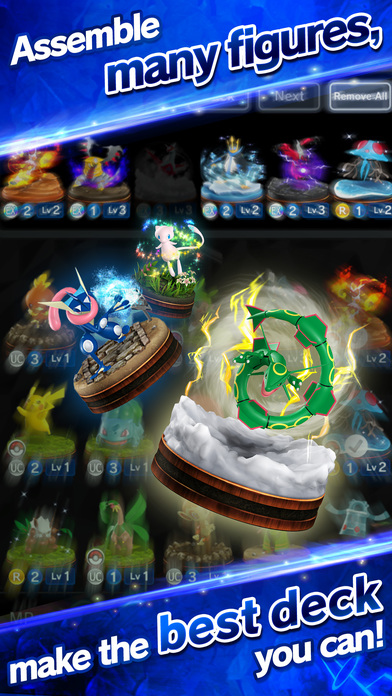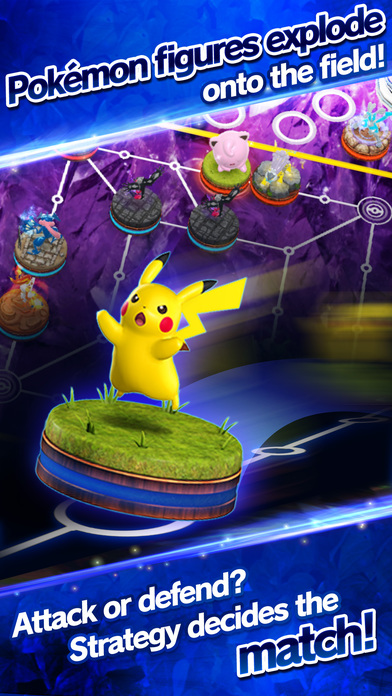The Pokémon Company surprised North American Pokémon fans with the impromptu western launch of Pokémon Duel, a mobile free-to-play strategy game inspired by the game franchise. Duel, released in Japan in 2016 as Pokémon Co-Master, takes the series’ classic turn-based mechanic and transposes it onto a board game. Two teams of six Pokémon square off against each other: Your job is to maneuver your squad across the board to capture your opponent’s base. When you clash with other team, your Pokémon fight via a spin-to-win mini game.
The result is a surprisingly rich board game, an exciting approximation of the Pokémon experience that only gets better the more you play. It’s close enough to the mainline Pokémon games and the Pokémon TCG to be familiar for series veterans, but enough of a change to differentiate itself from any other Pokémon title.
The game board is small, but deceptively complex
Pokémon Duel is like Pokémon meets chess, but with the accessibility of checkers. Each turn, you move a single Pokémon one to four spots across the board.
Despite the relatively small board — only 28 possible places for your pocket monsters to occupy — there’s a considerable amount of thought that goes into each turn. As you move across to your goal, you will inevitably start bumping into and dueling with the other team’s Pokémon. Each duel is decided by spinning a wheel of assorted moves. The highest hit point attack or status condition attack wins, and the loser is removed from the board while it rests in the Pokémon Center.
At first glance, this seems unfair, since it turns the battle into a game of chance, but that randomness makes the act of initiating a duel (or forcing your opponent into one) a calculated risk. Unlike the primary Pokémon games, your job isn’t to knock out the opposing team, it’s to reach the other side. (The tutorial even advises you to avoid initiating duels unless it’s absolutely necessary).
There’s just enough chance to make it feel like a Pokémon game, but its clever implementation allows strategic dominance to almost always prevail. If you’ve used your turns wisely, the end result will either help you or not really affect you at all. If you’ve been reckless, you might be looking at imminent defeat.
Free-to-Play done remarkably well
For a free-to-play game, Duels is brimming with content. You can battle online against other trainers in real-time, or you can play against AI in the game’s single-player story mode.
It’s like Pokémon meets chess, but with the accessibility of checkers.
The campaign is a surprising time-sink. It features over 100 missions across 10 buildings, each progressively more challenging than the last. As you complete missions, you earn coins to level up your Pokémon, and customize their movesets. For those who don’t like the duel format, leveling up will lower the amount of chance involved. You can also win Pokémon at the end of each mission, and use them to build new decks. Without spending a dime, you can lose at least 10 hours to the thoroughly engaging campaign. It’s well-designed and worthwhile, as it enriches the total package by offering up a plethora of goodies throughout.
When you want to take your skills online, you will be better equipped to handle the challenge of human opponents. Matches may last longer, waning on for 100-plus turns, but the focus is still on making smart choices. Chalk it up to quality AI, but Duel, unlike many mobile games, remains consistent whether playing computer or human opponents. Still, you get more of a rush from vanquishing other trainers, and the core mechanics aptly translate into fun multiplayer matches.
Free-to-Play woes, and missed opportunities
Still, Duels is not without its downsides. Despite offering a wealth of content sans dishing out real cash, you will likely find yourself competing against a player who has paid for gems, and chances are you’ll have to think twice about each move. This is the unfortunate reality of free-to-play models. You can play for dozens of hours, yet your deck could pale in comparison to someone’s who bought a truckload of gems an hour after installing the game.
There are also some glaring technical issues. The menu screens are cumbersome, and complex to navigate at first. Like Super Mario Run, Duel requires an internet connection at all times for reasons that could probably be explained, but hardly seem practical. The forced internet connection seems doubly oppressive when you get locked out of playing a single-player match.
Lastly, it feels like a missed opportunity that The Pokémon Company could not find a way to link Duel with Pokémon Go. Duel lacks the traditional “catch ‘em” all mentality, as Pokémon are either bought or randomly awarded; Go lacks a satisfying way to make your Pokémon fight; the two games could complement each other very well with the right connectivity. A feature where Pokémon captured in Go could be transferred to Duel would instantly increase the player base of both games, and strengthen both titles.
The arrival of a true Pokémon mobile game
Still, Duel’s triumphs far outweigh its minor flaws, especially considering Duel is free-to-play and brimming with quality content without forcing you to scale a paywall. The deft blend of luck-based duels and classic tactical strategy makes Duel stand out from the pack.
Whether you see it as a board game, a Pokémon dueling “sim,” or turn-based strategy, Pokémon Duel seems like a game worthy of the Pokémon name. Equally equipped for both short and long play sessions, making it accessible to casual gamers and hardcore enthusiasts alike, Pokémon Duel could be the best Pokémon experience available on a smartphone.
Pokémon Duel is available now on iOS and Android devices.
Highs
- Lengthy campaign
- free-to-play done right
- Easy to pick up, hard to master
- Perfect combination of skill and luck
Lows
- Active internet connection required
- Obtuse menu system
- Doesn’t link with Pokémon Go












